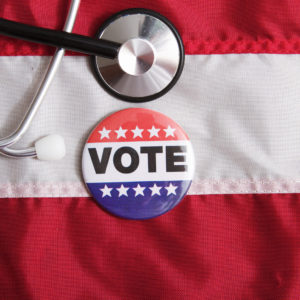Repeat after me: Health care is the top issue that will drive voter turnout in November.
Health care is the be-all, end-all issue of this midterm election cycle because it unifies voters across backgrounds, political ideologies and demographics.
Whether it is hikes in health care premiums or unexpected medical bills, the threats to the Affordable Care Act’s protections for more than 130 million Americans living with pre-existing conditions, or the astronomical costs of medical prescriptions, voters will mobilize next month because their lives are at stake.
In a recent poll conducted by the Kaiser Family Foundation, 71 percent of voters said that health care is “very important” in deciding who they’ll send to Congress, and the largest share of voters chose health care as the “most important” issue in their voting decision for Congress this year.
It’s clear that Americans are going to the polls to vote on health care and this election cycle they’re looking to candidates for solutions to what many consider to be a broken health care system. Of course, players on the Left and the Right are responding to voters’ focus on health care — albeit in vastly different ways.
Democrats Double Down on Health Care
With health care front and center for voters, Democrats have been redefining the concept of “message discipline,” constantly referencing health care and pre-existing conditions in countless ads, debates, interviews and stump speeches.
They’re amplifying the voices of everyday Americans who are sharing stories about how the Affordable Care Act saved their lives; they’re highlighting how President Trump and congressional Republicans have fought to undermine Americans’ access to care; and they’re presenting new policy approaches to ensure that Americans can receive quality, affordable health care.
Democratic challengers like Antonio Delgado in New York and Lauren Underwood in Illinois have engaged locals in ongoing conversations about health care and their needs throughout the cycle, and even emphasized their personal ties to the issue.
Democrats are using every megaphone available to beat the health care drum and they’re directly responding to the priorities of a large swath of voters who define health care as the top issue that will get them to the polls in November.
Republicans Edit their Script on Health Care
Republicans, on the other hand, are taking a “who said that” approach and making every effort to distance themselves from both the nine votes they took to repeal the Affordable Care Act in the GOP-led House of Representatives, and their support of Texas v. United States — a lawsuit brought by Republican attorneys general and supported by Trump that would invalidate the Affordable Care Act, and strike down key protections for Americans living with pre-existing conditions.
They’re deleting repeal language from their websites, changing their tone in ads, and moving as far away from their voting records on repeal as possible.
But while congressional Republicans are actively trying to sidestep their repeal efforts, Trump and Senate Majority Leader Mitch McConnell apparently didn’t get the message as Trump put forward a new rule this week that would allow states to undermine key protections under the Affordable Care Act, and McConnell announced plans to revisit repeal efforts if Republicans maintain control of both chambers of Congress after November.
Health Care Is on the Ballot
Voters across the country see this posturing by the top leaders of the Republican Party.
And let’s not forget, health care is not a partisan issue. According to the Kaiser Family Foundation poll, “health care costs unite voters nationally and in the bellwether states, with voters offering costs as the top health care issue this election.”
In the last days of this midterm cycle, voters are going to replay in their minds all the times congressional Republicans tried to repeal the Affordable Care Act and take away their health care. They’re going to relive the pain and surprise of unexpected medical bills and expensive prescriptions that their children need. And they’re going to take this with them as they go to the polls en masse next month, because their lives literally depend on it.

